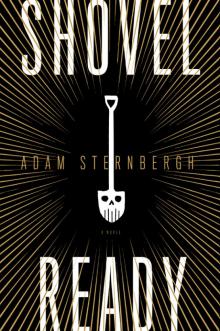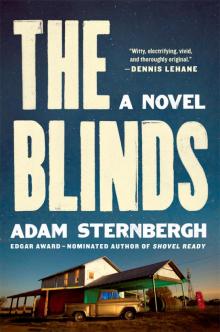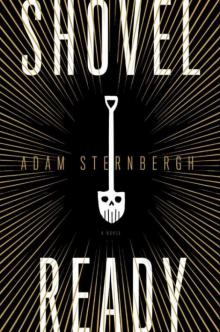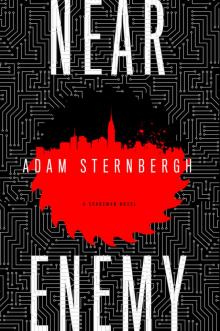- Home
- Adam Sternbergh
Shovel Ready: A Novel
Shovel Ready: A Novel Read online
This is a work of fiction. Names, characters, places, and incidents either are the product of the author’s imagination or are used fictitiously.
Any resemblance to actual persons, living or dead, events, or locales is entirely coincidental.
Copyright © 2014 by Adam Sternbergh
All rights reserved.
Published in the United States by Crown Publishers, an imprint of the Crown Publishing Group, a division of Random House LLC, a Penguin Random House Company, New York.
www.crownpublishing.com
CROWN and the Crown colophon are registered trademarks of Random House LLC.
Library of Congress Cataloging-in-Publication Data
Sternbergh, Adam.
Shovel ready / Adam Sternbergh. —First edition.
1. Assassins—Fiction. 2. Suspense fiction. 3. Dystopias. I. Title.
PS3619.T47874S49 2014
813′.6—dc23
2013012901
ISBN 978-0-385-34899-7
eBook ISBN 978-0-385-34900-0
Jacket design by Will Staehle
Author photograph: Marvin Orellana
v3.1
To
Julia May Jonas
Every human being who has ever lived has died, except the living.
—FREDERICK SEIDEL, “The Bush Administration”
Contents
Cover
Title Page
Copyright
Dedication
Epigraph
Part I
Chapter 1
Chapter 2
Chapter 3
Chapter 4
Chapter 5
Chapter 6
Chapter 7
Chapter 8
Chapter 9
Chapter 10
Chapter 11
Chapter 12
Chapter 13
Chapter 14
Chapter 15
Part II
Chapter 16
Chapter 17
Chapter 18
Chapter 19
Chapter 20
Chapter 21
Chapter 22
Chapter 23
Chapter 24
Chapter 25
Chapter 26
Chapter 27
Chapter 28
Chapter 29
Chapter 30
Chapter 31
Chapter 32
Chapter 33
Chapter 34
Chapter 35
Chapter 36
Acknowledgments
1.
My name is Spademan. I’m a garbageman.
—this fucker.
I don’t care.
Don’t you want—
Just a name.
I have his address.
Great.
See this fucker—
I said don’t.
Okay.
The less I know, etcetera.
How much?
What I said. To the account I mentioned.
And how will I—
You won’t hear from me again.
But how do I—
The dead guy. That’s how.
I don’t want to know your reasons. If he owes you or he beat you or she swindled you or he got the promotion you wanted or you want to fuck his wife or she fucked your man or you bumped into each other on the subway and he didn’t say sorry. I don’t care. I’m not your Father Confessor.
Think of me more like a bullet.
Just point.
—best friends. At least that’s what I thought. Then it turns out she’s fucking him.
Please, ma’am. I will disconnect. And this number doesn’t work twice.
Wait. Is this safe?
Which part?
Aren’t they listening?
Of course.
So?
Doesn’t matter.
Why not?
Picture America.
Okay.
Now picture all the phone calls in all the cities in America.
Okay.
Now picture all the people in all the world who are calling each other right now trying to plot ways to blow America up.
Okay.
So who the fuck do you think is going to care about you and your former best friend?
I see. Will you tell her—
No.
Will you tell her when you see her that it was me who sent you. It was me.
I’m not FedEx. I don’t deliver messages. Understand?
Yes.
Good. Now the name. Just the name.
I kill men. I kill women because I don’t discriminate. I don’t kill children because that’s a different kind of psycho.
I do it for money. Sometimes for other forms of payment. But always for the same reason. Because someone asked me to.
And that’s it.
A reporter buddy once told me that in newspapers, when you leave out some important piece of information at the beginning of a story, they call it burying the lede.
So I just want to make sure I don’t bury the lede.
Though it wouldn’t be the first thing I’ve buried.
It might sound hard but it’s all too easy now. This isn’t the same city anymore. Half-asleep and half-emptied-out, especially this time of morning. Light up over the Hudson. The cobblestones. At least I have it mostly to myself.
These buildings used to be warehouses. Now they’re castles. Tribeca, a made-up name for a made-up kingdom. Full of sleeping princes and princesses, holed up on the highest floors. Arms full of tubes. Heads full of who knows. And they’re not about to come down here, not at this hour, on the streets, with the carcasses, with the last of the hoi polloi.
Yes, I know the word hoi polloi. Read it on a cereal box.
I never liked Manhattan, even back when everyone still liked it, when people still flocked from all over the world to visit and smile and snap photos. But I do like the look of Tribeca. Old industrial neighborhood, a remnant from when this city used to actually make things. So I come across the river in the early morning to walk around here before dawn. Last quiet moment before people wake up. Those who still bother waking up.
Used to be you’d see men with dogs. This was the hour for that. But there are no dogs anymore, of course, not in this city, and even if you had one, you’d never walk it, not in public, because it would be worth a million dollars and you’d be gutted once you got around the corner and out of sight of your trusty doorman and your own front door.
I did see a man once walking a million-dollar dog. On a treadmill, in a lobby, behind bullet-proof glass.
Feed-bag delivery boy on a scooter zips past me, up Franklin, tires bouncing over the cobblestones. Engine whines like he’s driving a rider-mower, killing the morning quiet. Cooler on the scooter carries someone’s liquid breakfast. Lunch and dinner too, in IV bags.
Now it’s just nurses and doormen and feed-bag delivery boys out at this hour. Tireless members of the service economy.
Like me.
Phone rings.
—and how old is she?
Eighteen.
You sure about that?
Does it matter?
Yes. Quite a bit.
Well, she’s eighteen.
Got a name?
Grace Chastity Harrow. But she goes by a new name now. Persephone. That’s what her friends call her, so I hear. If she has any friends.
Where is she?
New York by now. I assume.
That’s not much to go on.
She’s a dirty slut junkie—
Calm down or I hang up.
So you’re just a hunting dog? Is that it?
Something like that.
Just a bloodhound in a world of foxes?
Look,
you need a therapist, that’s a different number.
She’s somewhere in New York, so far as I know. She ran away.
I have to ask. Any relation?
I thought this was no questions.
This matters.
To whom?
To me.
No, I meant any relation to whom?
T. K. Harrow. The evangelist.
Now why should that matter?
Famous people draw attention. It’s a different business. Different rates.
As I said, I’ll pay double. Half now, half later.
All now, and as I said, I need to know.
Yes. She betrayed his—
I don’t care.
But you’ll do it?
A fake name in a big city. Not exactly a treasure map. More like a mile of beach and a plastic shovel.
She said she was headed to New York. To the camps. They call her Persephone. That’s a start, right?
I guess we’ll find out.
May I ask you another question?
Go ahead.
You can kill a girl, just like that?
Yes I can.
Fascinating.
Before you transfer that money, you better make sure you ask yourself the same thing.
I hang up and write a single word on a scrap of paper.
Persephone.
Pocket it.
Then take the SIM card out of the phone, snap it, and drop the phone down a sewer grate, hidden beneath the cobblestone curb.
No motives, no details, no backstory. I don’t know and I don’t want to know. I have a number and if you’ve found it, I know you’re serious. If you match my price, even more so. Once the money arrives, it starts. Then it ends.
Waste disposal. Like I said.
It’s an old joke, but I like it.
Truth is, I never spend the money.
2.
I start at the camps. The biggest one’s Central Park. At first the rich at the rim of the park hired private guards to chase them out, tear down their tents, send them scurrying, by any means necessary. Then there was a couple of incidents, a few headlines, then a skinning. Private guards got creative. Peeled a kid and hung him upside-down from a tree. That didn’t play well, even in the Post.
All that’s over now. The rich never come out to the park anymore, could give a shit about Strawberry Fields, the camps have been here three, four years, long past anyone caring.
Dozens of pup tents, like rows of overturned egg cartons. Dirty faces. Drum circles and dreadlocks.
I ask around.
The first person who knows her has a forehead full of fresh stitches.
Bitch cut my face.
Band of white peeks up over his waistband. Not boxers. Bandages.
Looks like she didn’t stop there.
He picks at a stitch.
Hardy-har-har.
Kid nearby pipes up.
I knew her. Cute girl. Quiet. Pink knapsack. Wouldn’t let anyone near it.
You know what was in it?
Drugs, be my guess. That’s what most people hold on to tightly around here.
He’s a skinny kid with a shaved head, sprawled out on a ratty towel. Sleeveless t-shirt and sweatpants and thousand-dollar sneakers, barely smudged. The kind of kid who’s used to having other people run his errands for him.
I ask him the last time he left the park.
Me? Why? Truce with the cops seems cherry enough.
You have everything you need right here?
More like I don’t have anything I don’t need, you feel me?
Pretty girl peeks her head out of his tent before he shoos her back inside. Then he shoots me a look like, What can you do? Duty calls. I ignore it.
How well did you know her?
Persephone? Not as well as I would have liked. Common theme among the dudes living here, by the way.
You make a move?
Ask my friend with the stitches how that would have worked out.
So where did she go?
Just left in the night, far as I know. I woke up and all her stuff was gone. Most of my stuff too.
Any clue where she was headed?
No. But if you find her, tell her I want my blanket and my stash of beef jerky back.
You mind if I talk to your friend in the tent?
Smiles. Shrugs.
She’s all yours.
Pretty girl. Young. Far from home. Overalls and a red bandana tied over hair she cut herself. Seems sisterly. Figure she’s more the type Persephone might have opened up to.
I tap on the tent, then we walk out of earshot.
—we weren’t close. Talked a few times. Then I heard she left.
Why?
Made too many enemies. Or rather, unmade too many friends. Headed to Brooklyn, was what I heard. Maybe towards family.
That helps.
By the way, you’re not the only one come asking around for her.
Do tell.
Southern guy. Buzz cut. Those mirrored glasses, what do you call them—
Aviators.
That’s it.
How long ago?
Maybe a day. Maybe yesterday.
I say thanks. Then ask her a few things I shouldn’t.
How long you been here?
Me? A year, give or take.
Where’s home?
Here.
Before that?
Don’t matter.
And how old are you?
Look, you can’t fuck me, if that’s what you’re asking.
That’s not what I’m asking.
Well, maybe you can. Don’t give up too easy.
Thanks for your time.
Viva la revolución.
So it turns out my Persephone has a reputation. Everyone knows someone who knows someone who knows. The people who got too close to her usually have some memento. Something permanent, in the process of healing.
3.
Like I said, I don’t like Manhattan.
Like Brooklyn even less.
Personal reasons.
But I don’t like Brooklyn.
Never been to Staten Island. The Bronx only on business.
Queens I could take or leave.
But then, I’m from Jersey. Wrong side of the river. So maybe my aversion is hereditary.
Though to tell the truth, aversion and hereditary are both words my father never would have used. Might have cuffed me if he heard them coming out of my mouth.
He was a garbageman. A real one. The kind with garbage.
Didn’t like pretension.
Didn’t like the word pretension.
But he loved Jersey. That much he gave me.
I even tried to live in Brooklyn once, believe it or not. Didn’t take. But I tried it. Thanks to my wife.
I had a wife.
Believe it or not.
And I was a garbageman too, if you’re interested, a real one. The kind with garbage, like my dad. Left that too. Left most everything eventually.
Whatever hadn’t already been taken away.
Now I kill people.
The end.
People get upset when you say you kill people.
Fair enough.
But wait.
What if I told you I only kill serial killers?
It’s not true, but what if I told you that?
Now what if I told you I only kill child molesters? Or rapists? Or people who really deserve it?
Wavering yet?
Okay, now what if I told you I only kill people who talk loudly in movie theaters? Or block the escalator? Or cut you off in traffic?
Don’t answer. Think it over.
Not so self-righteous now.
I’m just kidding.
There’s no such thing as movie theaters anymore.
Subway, wheezing, barely makes it over the bridge, though I swear I feel that way every time.
The problem in this city used to be too many people. Now it’s not enough. And when only poor people u
se something, no one takes care of it. Roads, schools, neighborhoods. Subways too.
Rusted-out, empty, watch the track-slats pass as we travel. Moaning drunk curled in a corner, already done for the day. Pissed his pants, and not recently either.
Now to Brooklyn, that victim of tides.
My father took me to the beach once, pointed toward the water, eighty yards out. I thought, No way that ocean ever gets back to here. Two hours later, it was lapping at our ankles. And I thought, stupidly, No way it ever goes back out to there.
Money comes, the people come. Money goes, the people recede. After the blackouts they left, then after the boom they came back, then after the attacks they left again. Not everyone, of course. Just the people who’d tried to turn Brooklyn into the suburbs, got a whiff of a dirty bomb, figured fuck it, and moved to the regular suburbs.
Anyway, tide’s out now.
Brownstones are back to being barren. Concrete blocks where windowpanes went. Concrete blocks are the blind man’s stained glass, someone once told me.
After the attacks, the second ones, the whole borough emptied out. A boom, bust, and bang economy. The squatters and lesser vagrants just moved right back in. Like they were returning from a long vacation.
The Brooklyn camps in Prospect Park are more scattered, less crowded, less refugee pile-up, more Cub Scout jamboree. Tambourines and Hacky Sacks. Come nuclear winter, Hacky Sacks will prevail. A lone sack, being hackyed, on some burnt-out horizon. We’ll know civilization, and jam bands, survived.
I ask around. Same stories. She moved through here, quickly. I could have guessed. Not long for camps. She seems to attract the unwanted element in the open air.
Luckily the next step isn’t too hard to figure. Supposedly she’s headed toward family. And it turns out that her father, T. K. Harrow, the most famous evangelist in America, has a famous financier brother living in Brooklyn.
Yes, I know the word financier. Just don’t ask me to say it out loud.
In my business, the disadvantage of the famous is that they draw more attention. The advantage is that you can find out almost anything you need to know in about fifteen minutes, either online, from public records, or through a few well-placed calls. Because you know who has a good idea of who lives where?
Garbagemen.
They notice. Know addresses. Not everyone. But the notable ones.
So I make a few well-placed calls.
Find out a certain Lyman Harrow lives in a mansion in Brooklyn Heights. Likes to throw things out. Expensive things.

 Shovel Ready
Shovel Ready The Blinds
The Blinds Shovel Ready: A Novel
Shovel Ready: A Novel Near Enemy
Near Enemy